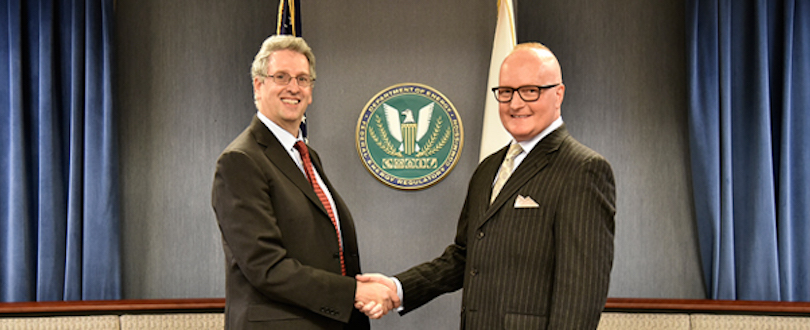Ethics officials at the Federal Energy Regulatory Commission (FERC) — the agency responsible for approving energy infrastructure such as interstate oil and gas pipelines and overseeing utilities — recently gave the OK for its new chairman, Kevin McIntyre, to be involved in decisions concerning two of his former clients and previous firm, DeSmog has found.
According to a document filed with the Office of Government Ethics, in December 2017 and January 2018 FERC provided McIntyre with a special authorization to participate in discussions and rulings related to two large utility companies, Ameren and American Electric Power (AEP), as well as his former legal and lobbying firm, Jones Day.
The document does not specify which matters McIntyre participated in for these utilities, and whether he was involved with specific Jones Day clients. A search of current FERC dockets reveals that Jones Day represents several clients before FERC.
Yet FERC and McIntyre declined to answer questions on the authorization. Ameren, AEP, and Jones Day also did not respond to requests for comment.
But ethics experts are concerned. Tyson Slocum, director of the energy program at the government watchdog group Public Citizen, says the authorization raises questions about McIntyre’s duty to remain impartial.
“Since he represented these companies for years before FERC, it raises questions whether as chairman [he] can effectively put aside his recent work for these companies and represent a broader public interest as a federal regulator,” Slocum said. “It’s not to say he’s unethical — but allowing him to participate in these matters will now raise inherent conflicts of interest concerns.”
Slocum says that while such authorizations are usually reserved to situations where no one else can fill the official’s role, FERC now runs with all of its five commissioners. “It’s not like the commission is far from a quorum. Since the commission is at full capacity, his recusal from these matters should not hinder its work.”
McIntyre, a Trump appointee to chair FERC, started his tenure in December last year. As a lawyer who co-led Jones Day’s global energy practice, he represented until his appointment an extensive list of utility, pipeline, oil, gas, and coal companies, as DeSmog first published.
These businesses included Ameren, the St. Louis, Missouri-based utility and power generation company that delivers electricity and distributes gas to over 1 million customers in Missouri and Illinois, and AEP, the large Columbus, Ohio-based electric utility, which supplies customers throughout the Midwest and Southwest U.S. by operating 60 power-generating facilities.
For Slocum, McIntyre’s appointment to FERC highlights the broader problems inherent in the revolving door phenomenon, in which government regulators move seamlessly to and from the industry they oversee. “Where the lines and allegiances are blurred with these type of appointments, such issues are bound to occur,” he said.
The issue is especially pronounced at FERC, which has seen many of its commissioners go through the revolving door.
In the past three years alone, former commissioner Philip Moeller left to join the Edison Electric Institute, the national utilities trade group; Tony Clark became a senior advisor at Wilkinson Barker Knauer, which represents energy companies before FERCmoved on to head the energy group at Willkie Farr & Gallagher; and most recently, Collette Honorable became a partner at the legal and lobbying firm Reed Smith, which among others, represents energy giant Dominion.
Main image: Right, FERC Chairman Kevin McIntyre shakes hands with fellow commissioner Richard Glick, left. Credit: FERC, public domain
Subscribe to our newsletter
Stay up to date with DeSmog news and alerts






